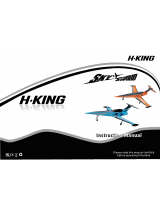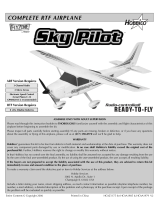
3E-flite Beechcraft 480 Staggerwing 480 ARF Assembly Manual
Important Information
Regarding Warranty Information
Please read our Warranty and Liability Limitations
section before building this product. If you as the
Purchaser or user are not prepared to accept the
liability associated with the use of this Product, you are
advised to return this Product immediately in new and
unused condition to the place of purchase.
Specifications
Wingspan: 35.0 in (890mm)
Length: 30.7 in (780mm)
Wing Area: 354 sq in (22.9 sq dm)
Weight with battery: 22.0–25.7 oz
(625–730 g)
Weight w/o battery: 28.6–32.3 oz
(740–915 g)
Using the Manual
This manual is divided into sections to help make
assembly easier to understand and to provide breaks
between each major section. In addition, check boxes
have been placed next to each step to keep track
of its completion. Steps with a single circle () are
performed once, while steps with two or more circles
() indicate the step will require repeating, such as
for a right or left wing panel, two servos, etc.
Remember to take your time and follow the directions.
Introduction
The Beechcraft Staggerwing was the realization of
Walter Beech’s bold vision for an executive transport
that could fly farther and faster than anything else at
the time. That he realized his vision in 1932, in the
midst of the Great Depression, is as remarkable as
the revolutionary design born from it. With a speed
of over 200 mph and range of over 800 miles, the
Staggerwing eclipsed the performance of everything
else in its class and was an instant success. Many
Staggerwings still fly today, their graceful lines turning
as many heads now as they did back then.
E-flite is pleased to bring you this exciting Staggerwing
ARF that is sure to be as big a hit as its full-scale
inspiration. Modeled after an aircraft used by the
U.S. Navy as a V.I.P. transport, the E-flite Beechcraft
Staggerwing 480 comes constructed of Z-Foam
™
with
carbon rod spars in the upper and lower wings. Most
of its scale features, such as the detailed cockpit, clear
windows, functioning flaps and authentic paint scheme,
are already installed or applied.
Best of all, assembly is about as simple as it gets
for an ARF with this level of detail. Only four sub-
micro servos are required for all control surfaces
and the horizontal stab comes in one piece for easy
installation. The model even has a small chamber in
the fuselage for housing an air tank should you want
to add the optional pneumatic retracts.
Table of Contents
Notice ......................................................................2
Meaning of Special Language ...................................2
Warnings ................................................................. 2
Introduction .............................................................. 3
Important Information Regarding
Warranty Information .......................................3
Specifications ...........................................................3
Using the Manual .....................................................3
Contents of Kit/Parts Layout ...................................... 4
Hardware/Accessory Sizes ....................................... 4
Recommended Radio Equipment ................................ 4
Park 480 Motor Setup ............................................... 4
Optional Accessories ................................................4
Optional Retracts ......................................................4
Required Tools and Adhesives ...................................4
Binding the Radio System ..........................................4
Before Starting Assembly ..........................................5
Aileron Servo Installation ..........................................5
Flap Servo Installation ............................................... 6
Fixed Landing Gear Installation ................................. 7
Retract Landing Gear Installation (Optional) ...............9
Horizontal Stabilizer Installation ..............................12
Rudder Preparation .................................................13
Vertical Fin and Tail Wheel Installation .....................14
Elevator and Rudder Servo Installation .....................16
Motor and Speed Control Installation ....................... 18
Receiver and Motor Battery Installation ....................20
Retract Air Tank Installation (Optional) .....................20
Final Assembly ....................................................... 21
Center of Gravity .................................................... 23
Control Throws ....................................................... 24
Preflight ..................................................................25
Range Test Your Radio ............................................. 25
Flying Your Model ...................................................25
Daily Flight Checks .................................................26
Limited Warranty ....................................................26
Warranty Services ..................................................27
Academy of Model Aeronautics
National Model Aircraft Safety Code ..............28
Building and Flying Notes ................................. 30–31
























